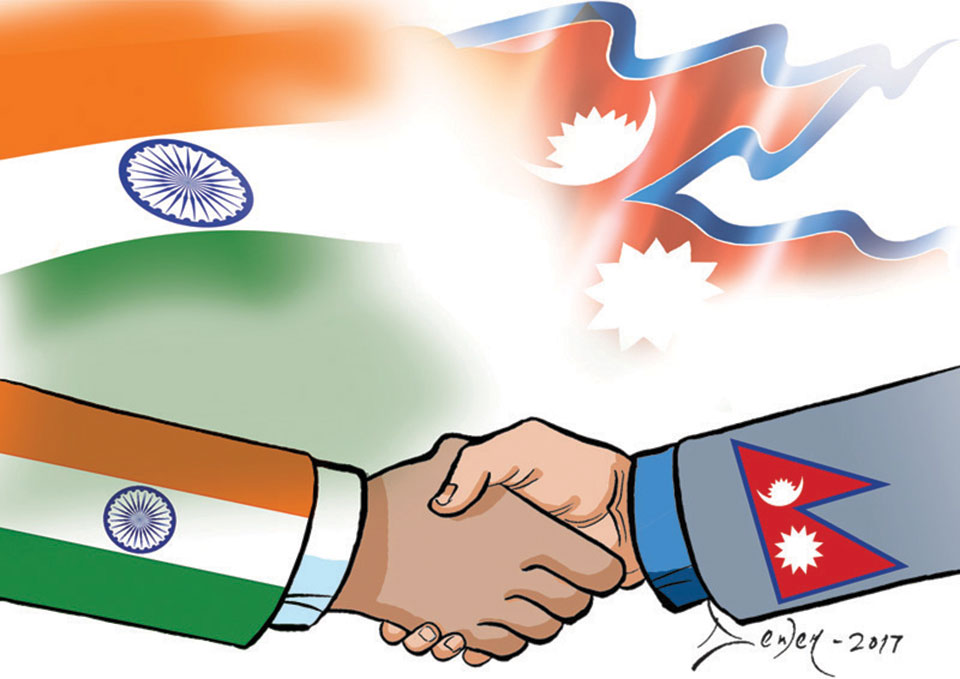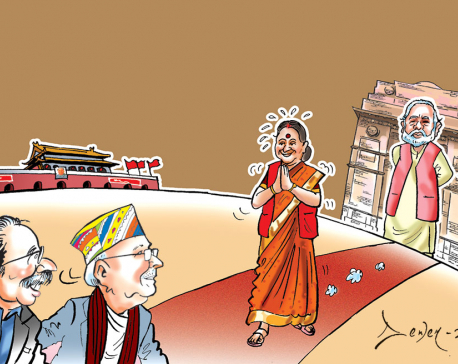
OR
Nepal-India ties

More from Author
We need to depart from conventional thinking of Nepal-India relations to address each other’s concern in a pragmatic way with new approach
Geography has placed Nepal and India unchangeably together. Thus we are not only land-linked but also river-linked. We share same sky and breadth same air. Shared civilization, social bonds, cultural affinity, comprehensive bilateral economic engagements and extensive people-to-people contacts have provided solid foundation of our relations.
Nepal has successfully overcome political transition by completing the three tires of elections under the new constitution ushering a new era for stability and socioeconomic transformation. Constitution has reaffirmed our collective efforts in placing Nepal as an accountable and responsible federal democratic country in the comity of nations. As it is marching ahead with development agendas Nepal needs more goodwill and cooperation from neighbors like India and China to realize developmental pursuit and to make Nepal prosperous at the earliest.
Security is a sensitive issue for both Nepal and India. This issue is still looked from the conventional approach and stands one of the main factors coming across in the course of improvement of Nepal-India relations.
New security challenges are emerging. Based on the magnitude of sensitivity of these challenges, we need to address the root causes of the sense of insecurity that prevails between Nepal and India through new and effective approaches. Globalization and unfolding economic and scientific developments have changed perception of both conventional and non-conventional security.
If we succeed to outweigh the issue through peace and good governance, economic prosperity and by scientifically managing border related issues we will be able to clear misperceptions of security issues.
Mutual concerns
Goldman Sachs has predicted that India’s population will surpass China’s within a decade and there will be acute scarcity of water for growing population in India. India will then certainly seek to benefit from our water resources—which we have in abundance.
We need to set an amicable benchmark for judicious sharing of water flowing from our thousands of perennial rivers to India to meet their water, food and energy securities which are vital for livelihood of ever growing population in India.
At the same time inundation in Nepal’s plains due to construction of embankments across Indian side in one and half dozen areas of the border areas including Koshi barrage demands an urgent action as monsoon is fast approaching. Nepalis have often been disfranchised from water dealing with India in the past and they have not been able to derive legitimate share of benefit from it. It has created a looming suspicion among Nepalis about Nepal’s water related deals with India. We need to deal with such issues pragmatically. Only this could help unlock Nepal’s hydro based potentials for the beneficial use of both India and Nepal.
Our trade deficit is unsustainably in favor of India. An unsustainable balance of payment ever hovering by more than twelve folds is not eventuality beneficial for India as well. This ignites economic differences between Nepal and India. Thus, a refurbished economic and development policy is imperative to lessen this gap by eliminating all trade related barriers. A liberal trade facilitation measure, development of trade infrastructure and connectivity, productive investment in mega projects in Nepal from India could help Nepal to augment its competitiveness.
Excessive import of power and petroleum from India is one main contributor to widening trade gaps. Nepal should not hesitate to break this monopolized chain to import fuel and power from other countries as well at concessional price that Nepal enjoys as least developed country (LDC) and landlocked country (LLC).
Nepal has already experienced three economic blockades from India, each in interval of around two decades. In all this, people suffered. Every blockade has compelled Nepal to shift its dependence towards northern neighbor sowing the seeds of anti-Indian sentiments among Nepalis. Nepalis at the moment hold the scar of the sufferings caused by five month long blockade of 2015/16. Nepalis suffered. India did not gain either. It faced domestic as well as international criticisms.
Change the mindset
Change of mindset is the key to change and development. While we received continued development assistance from India we also developed a number of misconceptions and differences that hindered the pace and prospect of meaningful cooperation between the two countries. We need to learn from the past mistakes and move forward accordingly.
The formation of Nepal-India Eminent Persons Group (EPG) is an encouraging development in the history of Nepal-India relations. Since Nepal-India relations are multidimensional, the task ahead for EPG is formidable. EPG has to submit its report taking into account various treaties and agreements between Nepal-India and suggest measures for improvements in consonance with changed bilateral, regional and international context.
Thus if EPG needs more time for this, its term should be extended for little more time so that it can address all the anomalies of Nepal-India trade and transit treaties, Koshi, Gandaki and Mahakali treaties, border problems and umbrella treaty of 1950. Apart from this, EPG should offer a vision to meet the aspiration of 21st century and beyond.
Due to geo-proximity and extensive contacts at all levels, it is but natural that we experience erosion of trust and confidence in Nepal-India relations from time to time. Ego-based differences have mostly created stumbling blocks in our bilateral relations. Time has come to take a departure from such conventional way of thinking by changing our outlook and address each other’s concerns in a more pragmatic way with new approach.
We need to engage in mutually beneficial activities without any prejudices. It is necessary to bring about paradigm shift in Nepal-India relations together with a newer vision. Gaining an enduring and everlasting trust, confidence and understanding to boost our relations should be our priorities.
Our non-aligned foreign policy and geo-political compulsion makes Nepal maintain balanced relations with China as well. This should not be seen by India with suspicion. Nepal’s neighborhood policy will be successful when India and China both feel happy in Nepal and when they join hands together for trilateral cooperation for mutual benefits of all.
The author, former ambassador to Brazil, is a Diplomatic and International Relations Analyst
You May Like This

Think beyond China
The idea of China card or India card has become obsolete. It is time to think of the alternative. ... Read More...

Exclusive: Putin-linked think tank drew up plan to sway 2016 U.S. election - documents
A Russian government think tank controlled by Vladimir Putin developed a plan to swing the 2016 U.S. presidential election to... Read More...

Infographics: Most Americans think Trump's wiretapping claims are false
Most Americans think Trump's wiretapping claims are false ... Read More...







Just In
- NRB to provide collateral-free loans to foreign employment seekers
- NEB to publish Grade 12 results next week
- Body handover begins; Relatives remain dissatisfied with insurance, compensation amount
- NC defers its plan to join Koshi govt
- NRB to review microfinance loan interest rate
- 134 dead in floods and landslides since onset of monsoon this year
- Mahakali Irrigation Project sees only 22 percent physical progress in 18 years
- Singapore now holds world's most powerful passport; Nepal stays at 98th












Leave A Comment